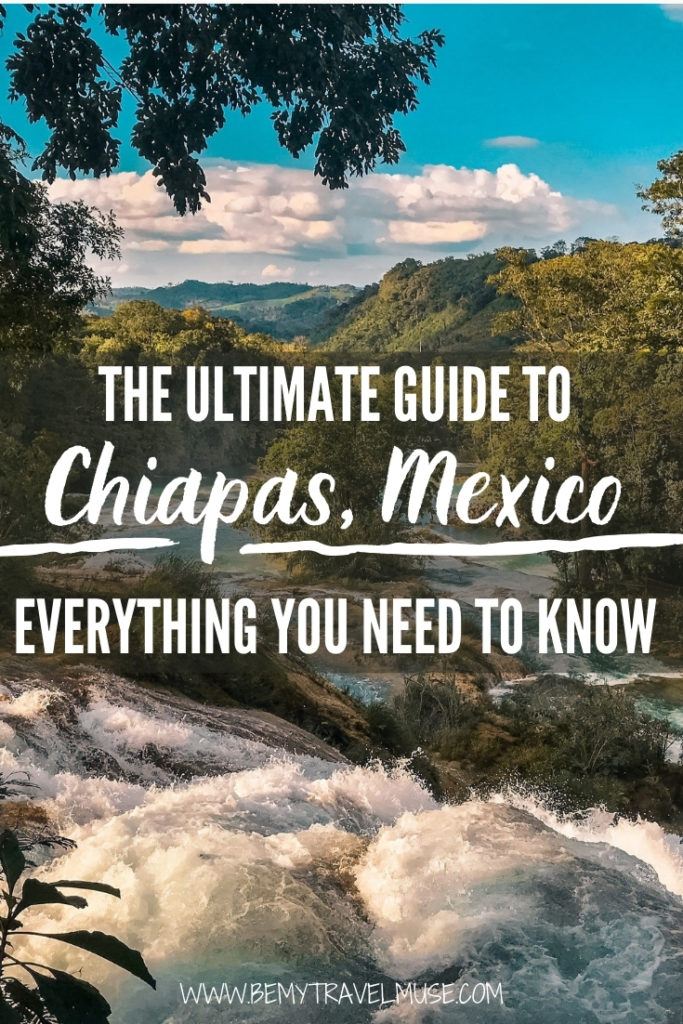
There’s something about Chiapas that gives my heart that little pitter-patter. Maybe it’s the landscapes, the incredible coffee, or the plentiful opportunities for adventure. Between the thick jungles, remote beaches, and high mountain peaks, this state in Mexico has so much to offer.
If you’re not convinced to come to Chiapas yet, here’s a better idea of what’s in store:
Waterfalls You’ll Fall in Love With
You may have seen the waterfalls of Chiapas posted all over Instagram and Pinterest. Crystal clear pools nestled in the mountainous jungles, oh my! What you see online about these waterfalls is the real deal. The areas where you can find these magnificent falls are protected by both governmental and non-governmental organizations and it shows. Here are a few that I personally recommend visiting:
Cascadas El Chiflón
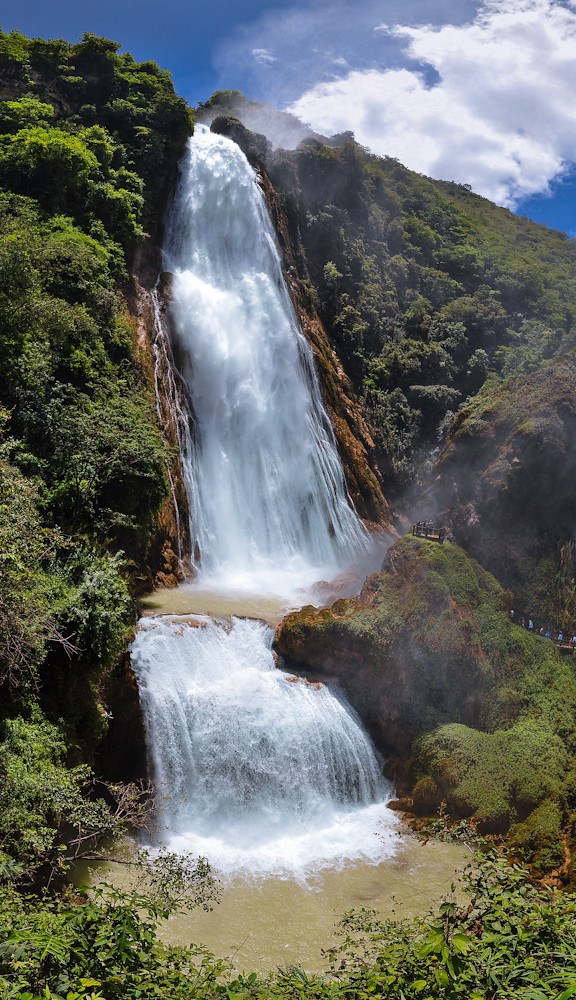
When you go to Chiapas, you cannot miss a trip to El Chiflón. It’s one of the most beautiful places I’ve been to in Mexico and unlike any other waterfall I’ve seen before. It’s about 2 and a half hours away from both San Cristóbal de las Casas and Tuxtla and 45 minutes from Comitán by car. The distance makes it a great option for a day trip from any of those bigger cities.
As you enter the park, you’ll see a small river below with a trail leading to the waterfalls. Moving along the trail, the waterfalls get bigger until you finally reach the most impressive one, Velo de Novia (the bride’s veil). At the end of the trail, there’s an amazing view of the waterfall and the mist rising from below. From that point, you can see the other trails around the falls, which are awesome to explore as well.
As you make your way back, you can actually zipline over the falls as a fun shortcut. I found it was an exciting way to see everything from above. It costs 200 pesos (about $10 USD) to zipline.
The entrance to El Chiflón is 50 pesos (about $2.50 USD).
Agua Azul
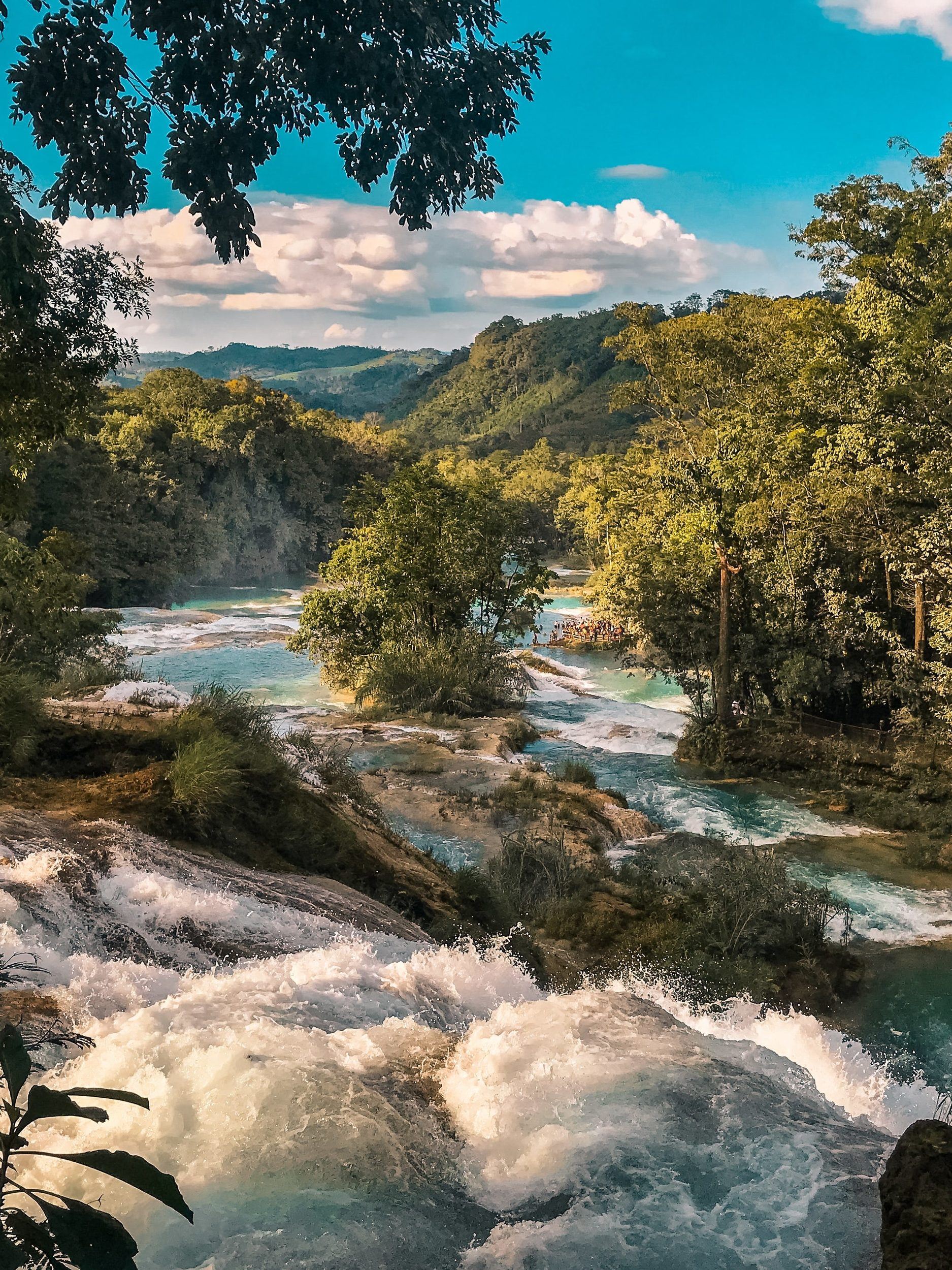
Since I arrived in Chiapas, everyone kept telling me I HAD to go to Agua Azul. After visiting, I understand the hype!
Agua Azul, gets its name from the intense turquoise pools both above and underneath the waterfall. It’s considered one of the best waterfalls in Chiapas because of its boisterous power and beauty.
However, I found Agua Azul to be crowded. There were so many food stalls, souvenir vendors, and large tour groups in such close proximity to the waterfall. It wasn’t a deal breaker for me, but it’s something to consider if you’re looking for a more low-key experience.
You can get to Agua Azul from San Cristóbal de las Casas, which is about 4 hours away. If you’re driving through Chiapas independently, it could be a great stop on your way to Palenque from San Cris or just as a quick day trip from Palenque. However, if you want to keep San Cris as your base, this tour picks you up from your hotel and will take you to both Agua Azul and Palenque in the same day.
Entrance to Agua Azul can be confusing. At the entrance to Salto de Agua ecopark (where Agua Azul is located), you have to pay a 10 pesos entrance fee. Then, you’ll have to pay again to actually access the falls, which will be another 20 pesos.
Cascadas Misol-Ha
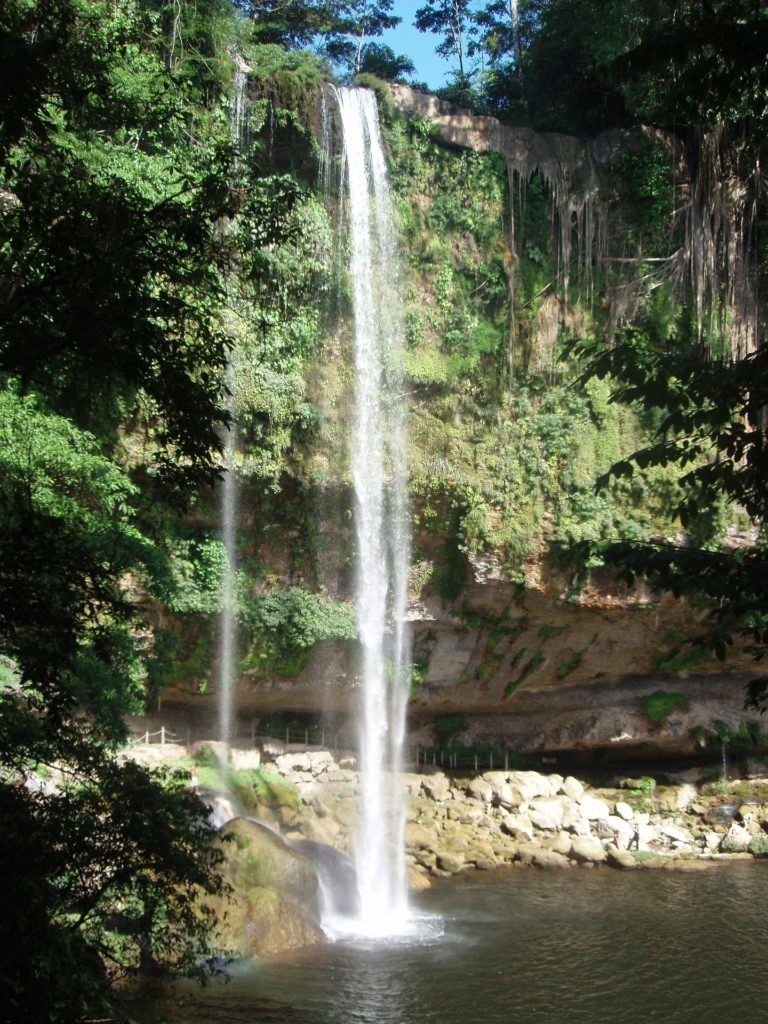
While the other waterfalls on this list are bright blue paradises, Misol-Ha has a totally different feel. Here you won’t find turquoise pools, but you will find a picturesque waterfall surrounded by bright green vegetation.
Misol-Ha is about 115 feet tall and towers above a pool that you can swim in. You can also follow a small trail that will take you right behind the mighty falls, which has a spectacular view.
This one is located close to Palenque. It’s about a 45-minute drive away and is often included on different tours going out from there. If you’re not into a tour, it’s easy to visit Misol-Ha from Palenque on your own.
This waterfall is another one where you have to pay twice to actually get to it. The first park entrance fee is 10 pesos, and then it’s another 10 pesos to access the falls.
Las Nubes
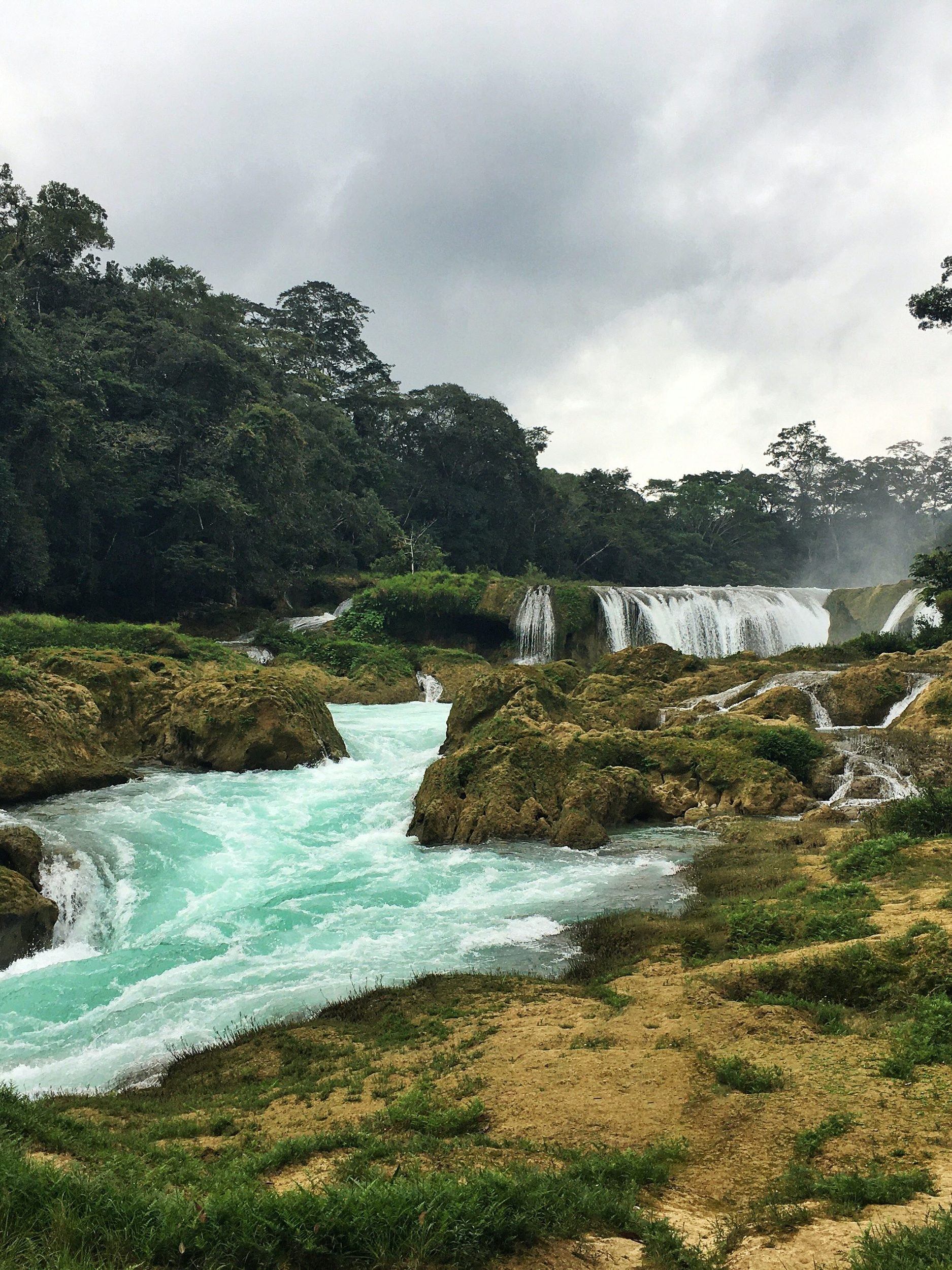
This stunning waterfall and waterway is much more remote than the others and is close to the Guatemalan border. It’s about a 5 hour drive from San Cristóbal de las Casas, but definitely worth the distance!
Las Nubes feels like you’re stepping into the garden of Eden. The lush greenery surrounding the brilliant blue waters with the round boulders above the cascades will take your breath away.
The best part of visiting Las Nubes is swimming in the blue pools above the falls. The water remains cool and refreshing year-round. It costs 30 pesos to enter the park. You can also rent a raft at the tourism center of the park for about $1,500 pesos (about $75 USD), which can fit up to 5 people.
Because of how far away Las Nubes is, I recommend spending a couple days exploring the area. You can easily camp around the park itself, or you can find other accommodation in Lagos de Montebello (see below). I camped nearby and enjoyed it, but another great option is this ecolodge which is right on the river.
Chiapas’ Best Archaeological Sites
Chiapas is located in southern Mexico, bordering Guatemala to the east. In fact, the general region of what is now known as Chiapas was part of Guatemala until 1824. This region of Mexico is known for being the most tied to its indigenous roots, which is evident in the local culture. You can often find local women wearing head-to-toe traditional clothing and there are many ceremonies and rituals that are still practiced here.
Chiapas is rich in indigenous culture and traditions that have been passed down for centuries. If you want a direct look into the past to better understand the roots of Mayan culture, take a trip to an archaeological site and dive head first into the beauty and mysticism of the ancient societies of Chiapas:
Palenque
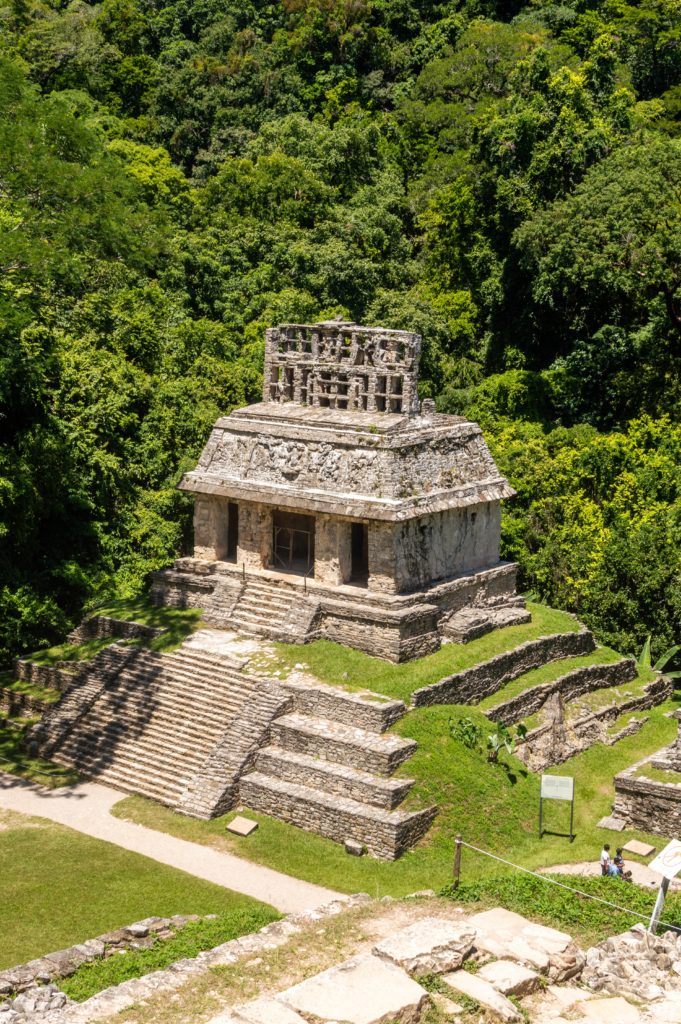
The first time I went to Palenque to explore the Mayan ruins there, I was speechless. I’ve been to my fair share of ruins and Palenque is by far my favorite.
The main temple on the grounds has a tomb inside, which used to house the deceased kings of the ancient city. You can go inside the dark, cavelike ruins and see where the kings used to lie. As you make your way through the ruins, I highly suggest hiring a guide. There are a lot of different symbols, sacred geometry, and even paintings which would be difficult to decipher without an expert present.
The city of Palenque has its own airport, which you can fly to from Mexico City. There isn’t a whole lot happening there, but it’s in the jungle and there are quite a few restaurants with traditional dishes to try. If you do go to Palenque, be prepared for humid weather and a lot of mosquitos!
Getting to the ruins from Palenque is as simple as driving there yourself or booking a tour once you get into town. These tours range from 300 to 1,000 pesos, depending on what is included. They are run out of local travel agencies, but you can also book one through GetYourGuide. The entrance fee for the ruins is 75 pesos, plus the 35 pesos fee to enter the surrounding national park where the ruins are.
Toniná
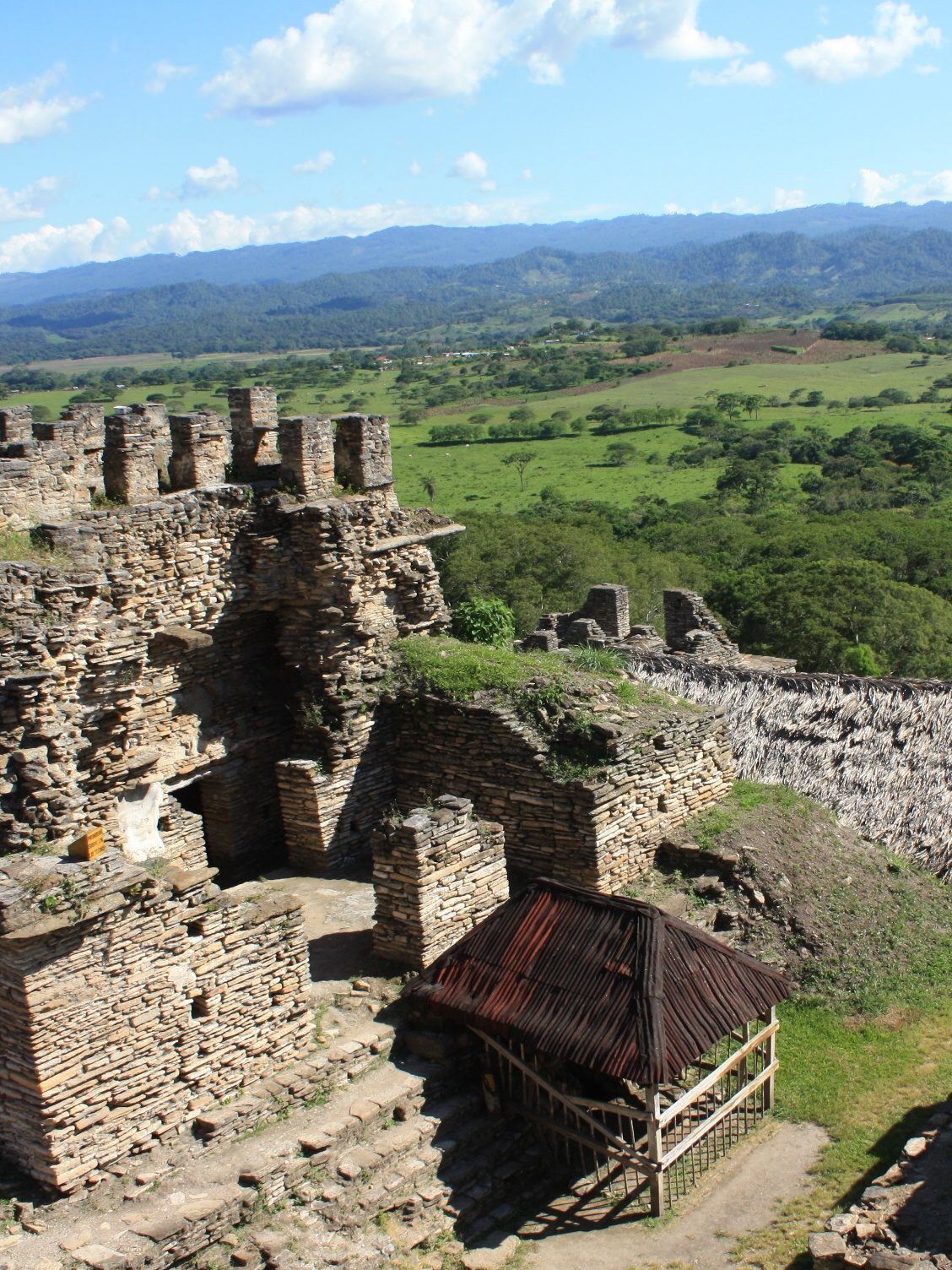
Meaning “House of Stone”, Toniná is the tallest archeological site in Mexico at 233 feet tall. If you’re ready for the climb of your life, you can trek up the stairs all the way to the top! I visited Toniná back in 2017 and was amazed at the view from the top of the main structure. With the gorgeous mountains in the background, it made the hike up totally worth it.
Toniná isn’t often crowded, and there’s a good chance you will have the site to yourself. It’s not a very well known archeological site yet, so it doesn’t have the same crowds you’d find at Palenque or other popular sites.
The entrance fee for Toniná is 46 pesos, which is cheaper than other big sites. Toniná is located just outside of the city of Ocosingo, which is about equidistant from San Cristóbal and Palenque, making it easily accessible from either of those cities. Tours to Toniná are often included in those which visit other archaeological sites, so it’s rare to find one that will just go there. One of those tours will cost around 500 pesos, which usually includes the park entrance fees.
Bonampak
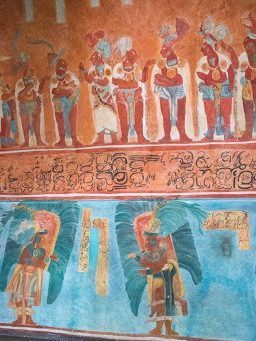
These ruins have the best preserved Mayan murals that have ever been found. When I saw them I couldn’t believe how old they were and it felt like I took a step back in time. The murals are the main focal point at Bonampak, and it’s worth hiring a guide to explain what they mean. There are some powerful images in the murals that give you an inside look at the ancient Mayan culture.
You can get to Bonampak from either San Cristóbal de las Casas, or more easily from Palenque. I recommend Palenque because it’s geographically closer and there are far more tours available. Taking a tour as opposed to tackling the ruins on your own won’t give you the same freedom of being on your own schedule, but it takes a lot of the pressure off.
If you decide to visit on your own, the park entrance fee to the park itself is 45 pesos, plus 25 pesos to enter the ruins themselves.
Yaxchilán
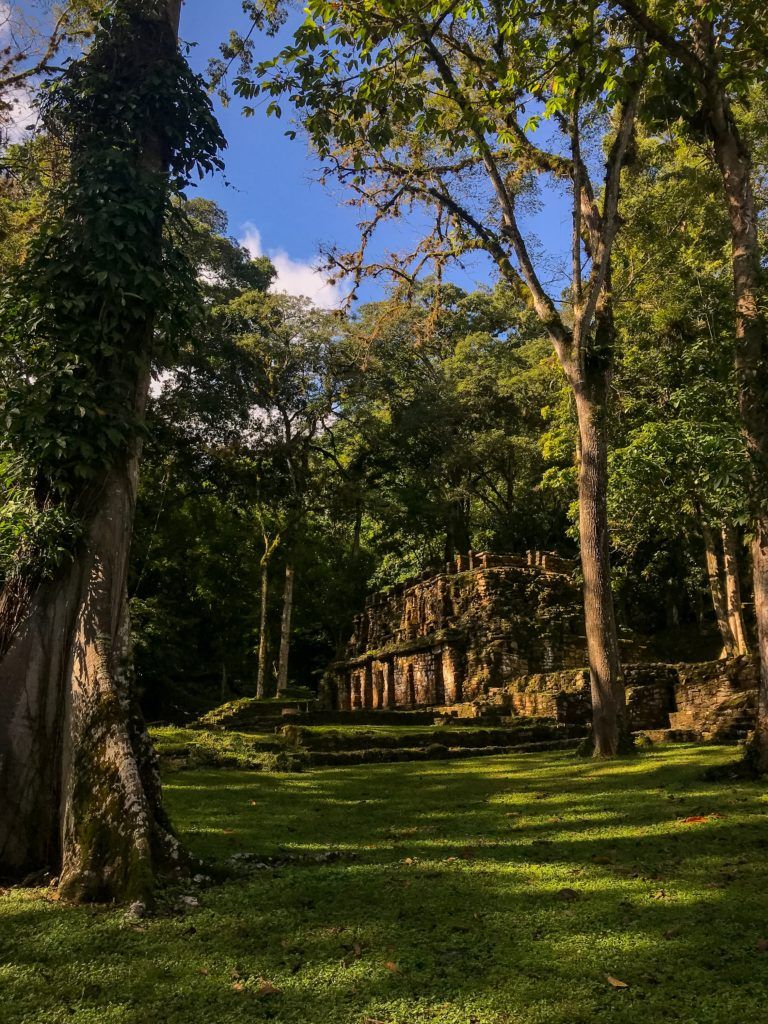
Located close to Bonampak, a trip to Yaxchilán will take you deeper into the jungle. The area around the ruins is one of the most sparsely populated places in all of Mexico, giving it some serious Indiana Jones vibes.
Yaxchilán is famous for the Maya hieroglyphs that are carved into the stones of the temples. These glyphs tell the story of the different dynasties of the ancient city. It’s fascinating to learn about these ancient civilizations and also interesting to ponder how much the world has changed since then!
Both Bonampak and Yaxchilán are off the beaten path and you won’t find the flocks of tourists like you will at many ruins in the Yucatan peninsula, for example. A tour that will take you to both of them from Palenque will cost around $40 USD, which doesn’t include a guide. Last time I went, I paid $10 USD at each place for a Spanish-speaking guide. If you don’t speak Spanish, you can ask for a guide who speaks English.
Getting to Yaxchilán is quite a journey and one you can take at your own risk. It involves crossing a river by boat, which can be expensive if you’re traveling alone. The entrance fee to the town itself is about 30 pesos, and there’s another fee to enter the ruins of about 30 pesos.
For ease, safety, and cost, I recommend doing a tour that will take you to both Yaxchilán and Bonampak which includes park fees and transportation.
Tenam Puente
Tenam Puente is just outside the small city of Comitan. The name literally translates to “defensive bridge” and was primarily used as a trading hub for nearly 1,000 years. You can climb the tallest temple there and get an awesome view of the scenery surrounding the site. There are also a few ball courts where the ancient Maya people used to play the sacred ball game.
One of my favorite things about visiting Tenam Puente was how empty it was when I went. Even though it was semana santa, or spring break, there were only a few groups of tourists in the entire site. It was at Tenam Puente that I felt much more connected to the spirit of the site and was able to sit with the peace and calm at this once-bustling city. If you can get a little bit of space, it’s cool to do a short meditation at the top of the temple.
The cost to enter the ruins is 45 pesos. If you’re curious about the Mayan ball game, consider hiring a guide who can take you through the courts and explain how it’s played.
Historic Towns
San Cristóbal de las Casas
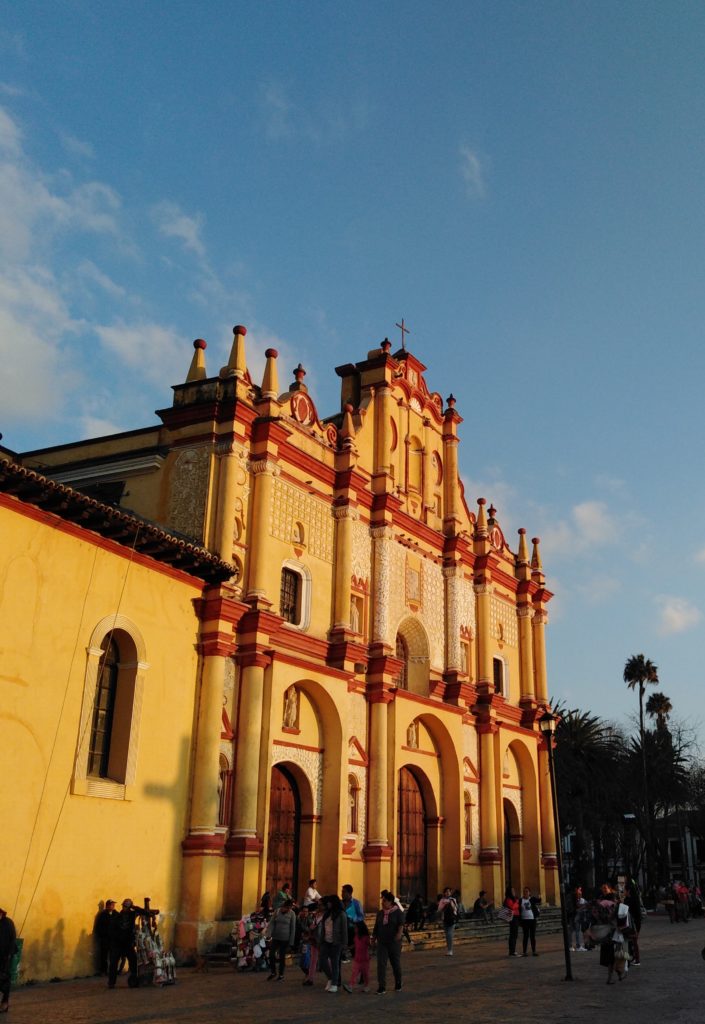
If you’ve read our post all about San Cristóbal de las Casas, you already know that San Cris has a very special place in my heart. It’s a charming colonial city high up in the mountains of Chiapas and a hub for artisans, yogis, and creative people of all kinds.
San Cris serves as a great base when visiting Chiapas because of how central it is. From here, you can easily take a day trip in any direction to visit ruins, waterfalls, and nature parks. Additionally, there is a wealth of history and culture here. With plenty of museums to visit and long pedestrian streets to stroll, you can spend a good amount of time here. I came here 4 years ago while traveling and I’ve just come back to stay – it has a magnetic quality!
San Cris is about an hour’s drive from the capital city Tuxtla Gutierrez, where the nearest airport is. If you’re renting a car to travel through Chiapas, I recommend doing so in Tuxtla as there is (literally) only one place in all of San Cris to rent a car. If you come during high season (around spring break and December), there is a chance that the rental company will be out of cars to rent.
San Juan Chamula
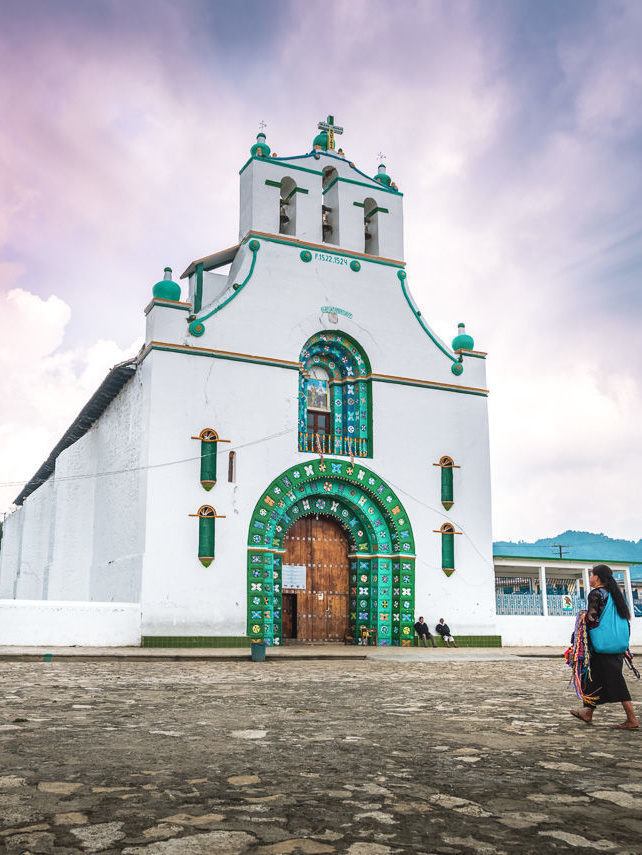
You’ll see signs all over the place about tours to visit San Juan Chamula as soon as you get to San Cris. This charming and mystical small town is only about a 20-minute drive from downtown San Cris and can be easily visited via taxi.
San Juan Chamula is known throughout the region as THE place to go to experience the heart of indigenous culture in Chiapas. The main attraction is an old church where priests, shamans, and local observers go to practice their sacred religious rituals. One of these rituals involves drinking Coca Cola and burping as a way of ridding the body of bad spirits. Yes, burping!
The cemeteries sprinkled throughout the town are a unique feature of Chamula. The grave sites at these cemeteries seem to pop up out of nowhere. In fact, it’s common practice in many indigenous communities here to bury loved ones in their own backyard. As buildings change hands or are knocked down, the graves remain.
It is important when visiting Chamula to be respectful of the local culture and customs. There is a very heavily-enforced rule at the church in Chamula that no phones or photography is permitted. There are signs outside that advertise this rule, and it applies to other sacred places there, too.
Zinacantán
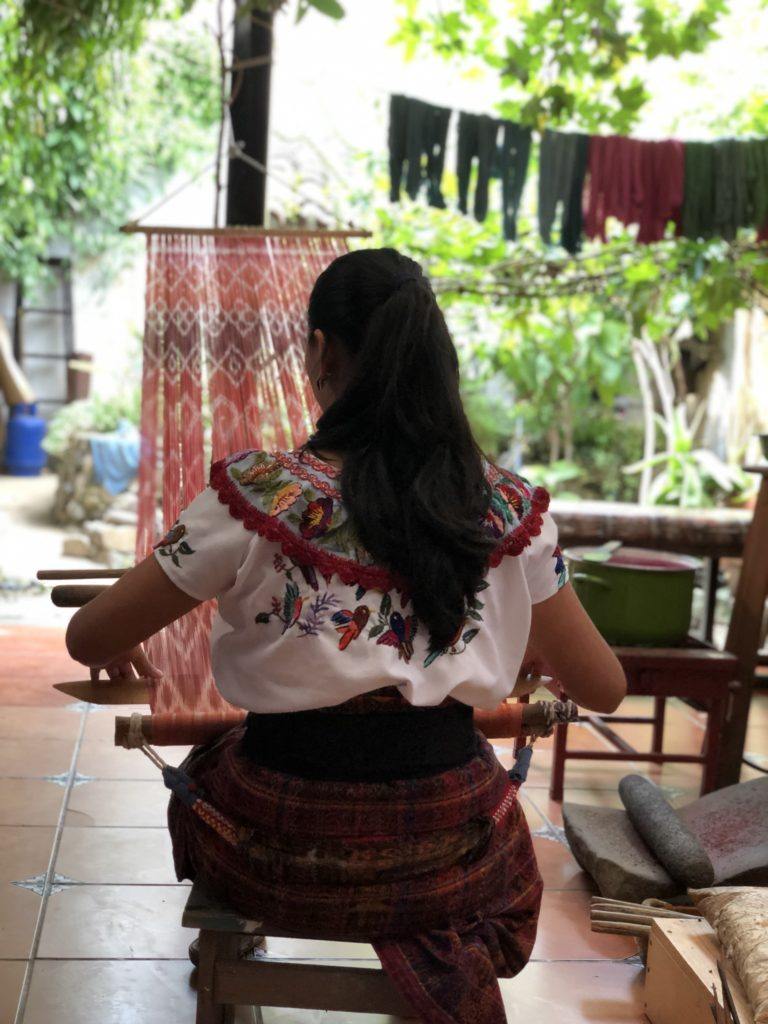
The first time I visited Zinacantán, I fell in love. This small town is best known for its handwoven textiles and traditional clothing. You’ll see women weaving fabrics by hand on a traditional waist loom. It’s fascinating to watch them carefully move the threads in and out of one another. It made me appreciate the meticulous care put into the garments. Read more about our favorite ways to support women when we travel here.
Most people in Zinacantán live off the textiles and clothing sold there, making it a great place to purchase souvenirs. That way, you can directly support the hard work of the artisans. The vibe of this town is much more laid back than San Juan Chamula, which made it easier to strike up a conversation with the locals.
There is a beautiful church in the center of Zinacantán that is definitely worth taking a peek at. During Catholic holidays, the church is filled with flowers which fills the space with a delightful floral aroma. There is no explicit “no pictures” policy at this church. However, it’s best to avoid taking pictures of people in their place of worship, no matter where you go. Stick to taking pictures of the architecture, the art, and the altars, but avoid snapping pictures of locals in the church.
You can easily go to both San Juan Chamula and Zinacantán in the same day on your own or with a tour. This one will bring you to both and even includes a traditional drink!
Chiapa de Corzo
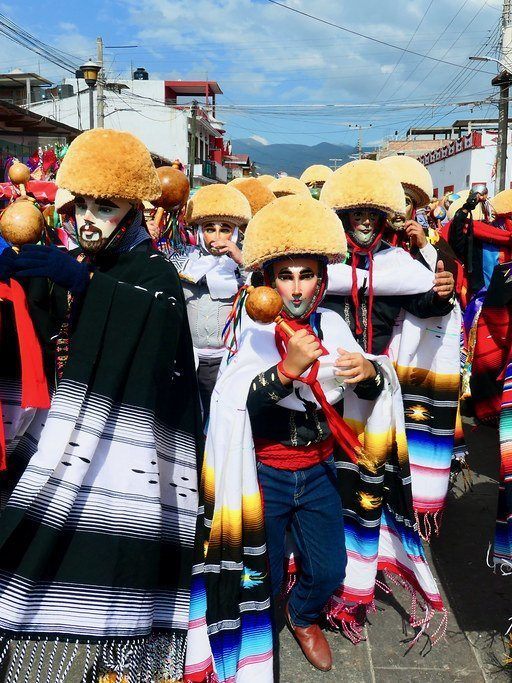
Do not, I repeat, do NOT go to Chiapas without going to Chiapa de Corzo! I might be partial to this magical town because of its delicious food, but there’s something for everyone there. If you want to get a taste of Mayan culture, this is the place.
Chiapa de Corzo is famous for its large festive celebrations including Dia de Los Muertos at the end of October as well as Christmas and Easter. Hang out in the main plaza and catch a glimpse of the dancers called parachicos moving together in synchronicity while wearing wooden masks and traditional wigs.
Beyond the cultural richness of the town, Chiapa de Corzo is located right next to Cañon del Sumidero. This canyon can be explored by boat while floating down the Sumidero river. There you might catch a glimpse of the crocodiles, monkeys, and birds that inhabit the area while you gaze up at the towering walls of rock. This tour includes both Chiapa de Corzo and Cañon del Sumidero and operates out of San Cristóbal, which is just a 45-minute drive away.
Comitán de Domínguez
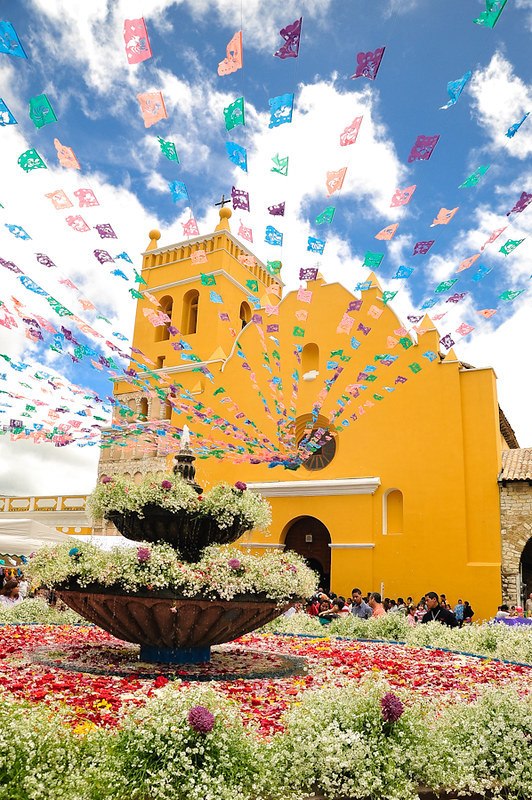
Comitán is the best base for exploring the wonders of southern Chiapas, as it is closer to many of the waterfalls mentioned above. This quaint town is known for its famous Christmas celebrations every year. The best part of visiting Comitán is how down-to-earth and non-touristy it is. Walking through the streets, you’ll likely see very few foreigners and not a whole lot of English happening in general, so be prepared if you don’t speak Spanish!
There also always seems to be music playing. The most common music to hear in the plaza is Marimba, which tends to illicit large crowds of dancing people. Join in if you can!
While you’re there, don’t miss the Rosario Castellanos Cultural Center, which hosts different art, music, and language workshops for the local community. It also has a theater, cafe, and bookstore inside and is right behind the Museo Arqueológico de Comitán. This museum is free and has some pretty neat artifacts from nearby ruins.
Coffee Farms
You don’t have to be a coffee connoisseur to know a great cup of coffee when you taste one. I’ve been ruined for life now because after tasting the coffee here in Chiapas, there is no going back. Whether you’re an expert on all things coffee or merely an enthusiast (like me!), here are a couple places where you can try some delicious brews and see where it all comes from:
Argovia
This coffee farm is by far the most famous on the Ruta del Café here in Chiapas. It can be found about an hour north of Tapachula in southern Chiapas and has its own hotel and resort attached. The hotel is a bit of a splurge to stay at, but you can easily take a day trip there from Tapachula and just tour the farm. There is nothing quite like sipping the freshest coffee you’ve ever tasted with the backdrop of rolling green hills.
Finca Hamburgo

This coffee plantation is one of the oldest in Chiapas and was founded by a German family. The hotel on the grounds has some amazing views of the coffee plants and mountains, which are covered in green vegetation.
They also have tours of the facilities where you can learn about the coffee making process, the machinery, and the different varieties of plants on the farm. At the end of the tour, you’ll get to try some of the freshest brews directly from the farm itself. Sounds like a dream!
Finca Hamburgo is a bit more remote than Argovia at about two hours north of Tapachula in the heart of the coffee region. Both of these places would make an excellent day trip from Tapachula, but could also be made into a longer trip if you fancy staying for a while at one of the hotels.
A Beach Destination Unlike Any Other
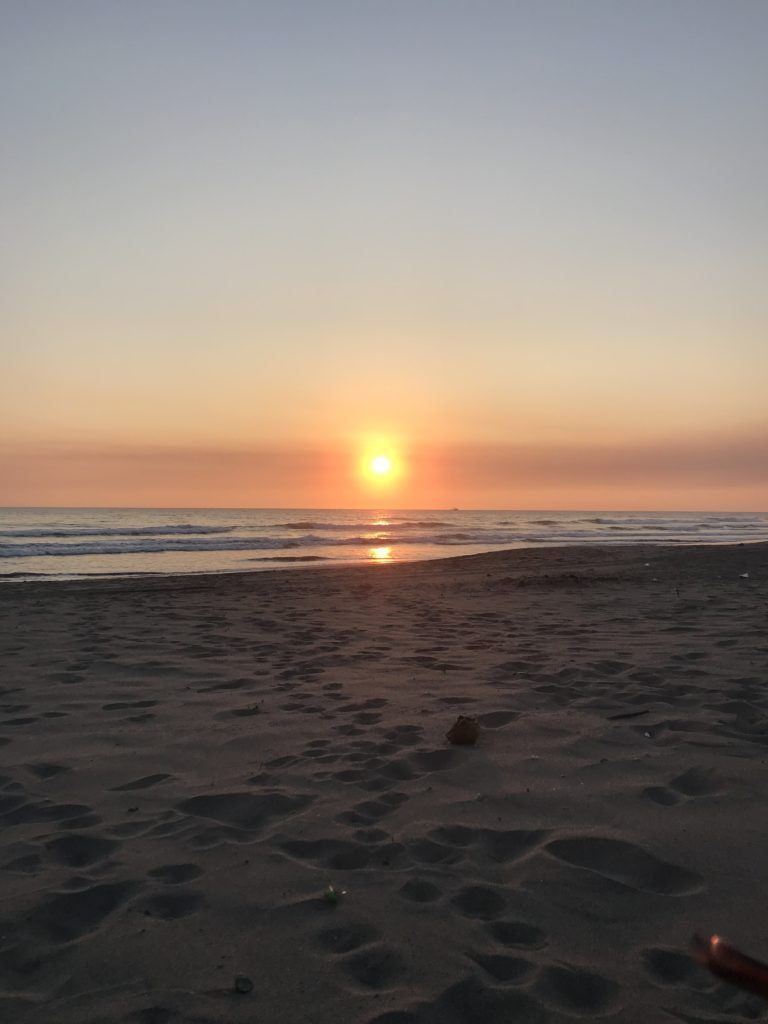
If you’re into the kind of destination that does NOT include big resorts and crowded beaches, the coast of Chiapas is for you. Boca del Cielo and Puerto Arista are the closest beaches to San Cristóbal de las Casas–about 4 hours away by car.
To get to the beach from San Cris, you will take the long and winding highway 190D for about 3 hours to reach Tonalá. This small city is the last place where you can find a grocery store and the best pit stop to stock up on snacks and drinks if you want to bring anything with you to the beach.
From there, you can drive (or take a taxi) to Puerto Arista where you’ll have to cross a lagoon by boat to get to the long strip of beach where you’ll find a few hotels spread out along the coast.
My favorite place to stay there is Entremares which has A-frame cabins and a geodesic dome. The rest of the buildings are built from earth and sand, which contributes to the overall eco-friendly vibe of the place.
The biggest draw of Puerto Arista and Boca del Cielo is the neat contrast of the lagoon with the mountains in the background and the grey beach on the other side of the isthmus. In this area you can take a dip in the lagoon and then walk for 5 minutes to then jump into the ocean. The best of both worlds!
Because of how remote this beach is, I recommend booking your accommodation ahead of time and clarifying with your host on how to get there. Boats that cross the lagoon are relatively cheap during the day (around $3 per person, per trip) but can increase at night.
Bonus: Lagos de Montebello
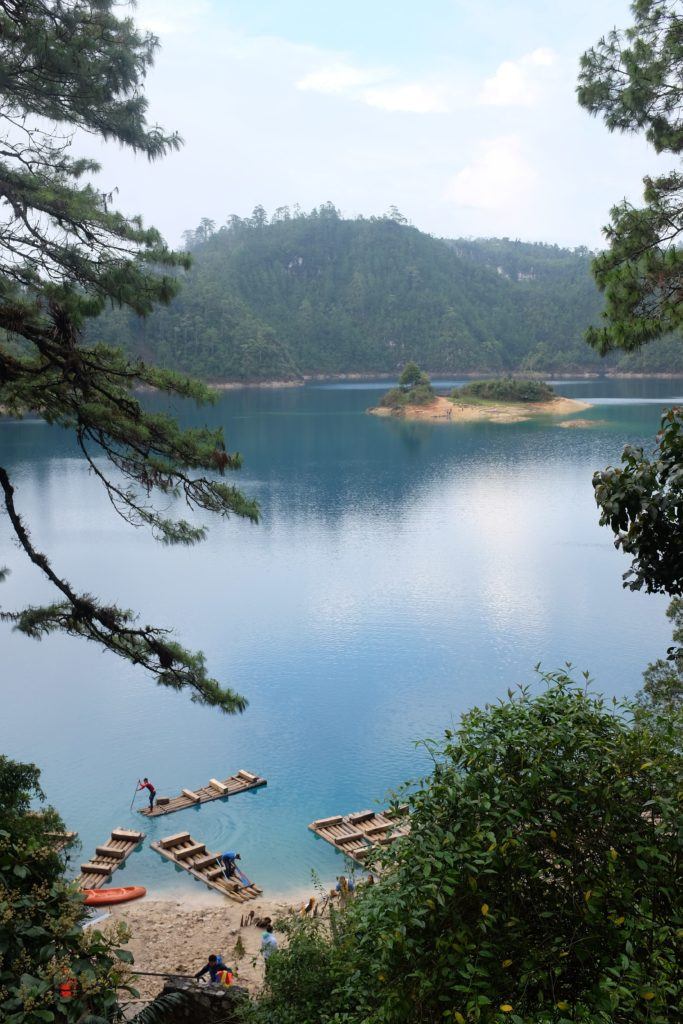
Imagine pulling up to a misty lake surrounded by pine-filled mountains after sleeping in the car for several hours only to realize you’ve stumbled upon paradise. That’s exactly what happened to me when I went to Lagos de Montebello while on a packed full-day tour.
This dreamy lake has a few small islands on it and is part of a chain of lakes along the Guatemalan border. Because of the altitude it gets quite chilly, especially during the winter months. I went in December when it was freezing cold outside! When the air is cold, the temperature of the water in the lake remains a few degrees warmer, creating steam above the lake.
The main activity at Montebello is floating around on a wooden boat, which are the same ones the Maya people used to cross the lake. From there, you’ll take a couple stops at different islands on the lake and you can even go for a swim!
Before You Go
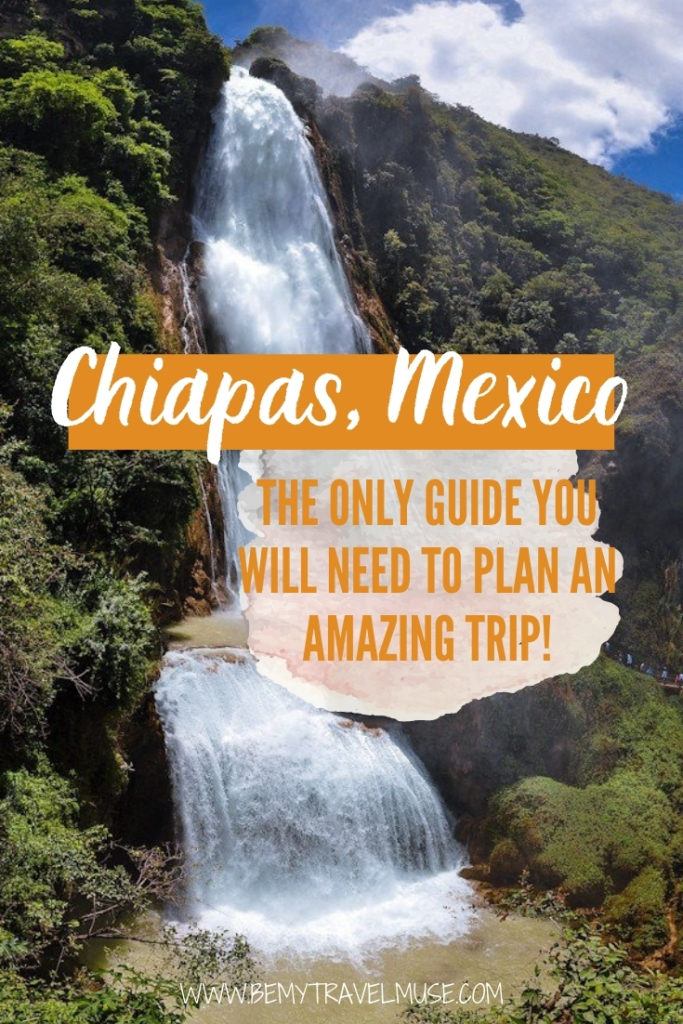
Since Chiapas is still relatively off the beaten path, there are a few things to keep in mind before traveling there.
- Road Blockades: It’s commonplace to be driving on the highway in Chiapas and see that a road has been blocked by demonstrators. If you’re taking a road trip, be prepared to take an alternate route if you find yourself in a long traffic jam due to a blockade.
- Children Selling Souvenirs: You can expect to see many children selling trinkets, bracelets and other souvenirs in Chiapas. While some people feel called to purchase from those children, I don’t recommend it. Check out this article or do your own research before deciding for yourself.
- Photography: As I said above, please be mindful when taking photos in Chiapas. Many travelers feel inclined to take photos of or with local children without the parent’s consent. Here’s an article to provide some perspective.
- Language: While other places in Mexico may cater more to an English-speaking crowd, there are many places in Chiapas where it may be difficult to find an English speaker. Knowing a few key phrases goes a long way here, so no need to become absolutely fluent. Try downloading the offline Spanish-English and English-Spanish dictionary on the Google Translate app in case you need a translation in a pinch.
- Leave No Trace: The principle values of Leave No Trace are not limited to national parks in the USA. Organizations are working hard to keep the natural beauty of Chiapas free of pollution. Consider this while traveling and try to avoid single-use plastic whenever possible!
- Supporting Local Communities: Chiapas has plenty of opportunities to buy directly from artisans. That being said, there are plenty of big stores selling cheap dupes of local handicrafts. If you want to read more about supporting local women and artisans, check out our post about it.
Wondering how to fit all these sites into one trip? Here’s a map of each of the places mentioned so you can start planning:
Chiapas feels like it carries the heart and soul of what Mexico once was. Going out to these remote places to take in the natural beauty of the landscape brought me a lot of solace during a time when everything else felt like it was being turned upside down. Chiapas is often overlooked as travelers tend to favor the Caribbean and Pacific coasts, but that is what has allowed it to maintain its originality. Next time you get the itch to visit Mexico, consider coming to bask in the beauty of Chiapas.
About the author: Emily is a Mexico travel enthusiast based in San Cristóbal de las Casas, Chiapas. She is a part-time freelance writer for BMTM and part-time doula.
Lily says
Thanks for this detailed! I am planning to visit San Cristobal in November 2022 with my family. We want to visit Palenque as a day trip with a tour company. Do you feel this is safe to travel on highway 199? I have read some things that are giving me pause, and would love to hear from someone with more experience in the area.
Emily says
Hi Lily!
How exciting that you’re planning to come to San Cristóbal. Visiting Palenque as a day trip from San Cris isn’t possible as the drive is about 6 hours (on a good day with no road blocks), so consider going for a few days at least. One day for travel each way, plus a full day to see the ruins, though I think two days with a guide is the best way to go if you have time.
Traveling on the highways here can be a bit of a wildcard. Right now I believe highway 199 might be a no-go because of some conflicts in one of the towns that it runs through. There are other routes that are safer, but they will take more time. If you want to get more info leading up to your trip, check out the San Cristobal Expats Community Facebook group, as people regularly update the page with their experiences traveling through the region.
I hope this is helpful and will give you some peace of mind about coming to Chiapas. I have lived here for about a year and a half and think it’s one of the most magical places in Mexico. Have a wonderful trip!